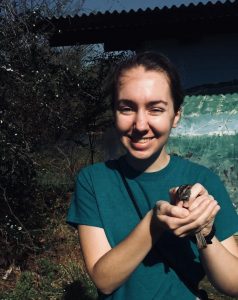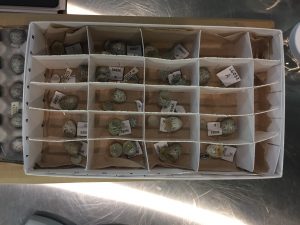NC State undergraduates Carol Gause and Kathryn Jewell have always had a passion for science, ornithology, and research. Now thanks to the College of Natural Resources (CNR) Enrichment Fund, they’ll be able to continue their work with Sparrow Swap, a nationwide citizen science project.
Kathryn’s passion for birds began at the NC Aquarium at Fort Fisher, where she served as a Lorikeet Attendant. She has been a part of Sparrow Swap in Dr. Cooper’s lab since January of 2018, where she works on an undergraduate research project focused on eggshell thickness.
Carol studies environmental science and has previous experience in the field with the U.S. Fish and Wildlife Service where she surveyed waterfowl. Working on the Sparrow Swap project lets her continue to learn more about ornithology.
The CNR Enrichment Fund is a grant that’s open to all undergraduate CNR students at NC State and offers to fund a variety of things including study abroad opportunities, conferences, unpaid internships, programming within CNR, and research. The funding Carol and Kathryn received will cover research expenses at NC State’s Chemical Analysis and Spectroscopy Lab. This testing will allow lab members to determine the concentration of various pesticides, industrial chemicals, and heavy metals in sparrow eggs.
Sparrow Swap based out of the Biodiversity Lab at the North Carolina Museum of Natural Sciences. This citizen science project aims to collect House Sparrow eggs in order to map contaminants, improve control of avian pests, and study geographic patterns in eggs. Sample eggs are sent in from birders all over the U.S., providing researchers with a diverse sample as well as results that carry meaning. One specific goal of Sparrow Swap is to determine whether sparrow eggs can be used as bioindicators for environmental contaminants that pose a risk to human health. Thanks to the grant Carol and Kathryn received from the CNR Enrichment Fund, this will become a big part of their independent projects at the Biodiversity Lab.

